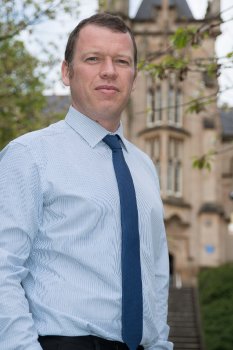
The University of Ulster is to open a new Centre for Renewable Energy Engineering at its Magee campus.
The new Centre, currently being fitted out with over £1m worth of sophisticated engineering equipment, will accept its first intake of 50 students this autumn. The engineering degree programmes run over four and five years, and will offer over 200 places once fully operational.
It's a development which extends existing engineering excellence at Magee, home to the University's Intelligent Systems Research Centre, whose expertise in electronic engineering has achieved international recognition since it opened on campus in 2007.
Director of the new Centre is Dr Justin Quinn, whose background is in mechanical engineering and composites technology. He's worked with international firms such as Bombardier and Airbus, as well as leading Northern Ireland firms including Powerscreen and Terex.
His experience gives him an understanding both of the international engineering context, and of the industry environment in Northern Ireland into which Magee engineering graduates will be seeking to build their careers.
"I see our new developments in engineering at Magee as servicing the industry in the north-west, providing well-qualified graduates who are familiar with the techniques and needs of the kind of engineering that is currently carried on in the region," he said.
"In the beginning, there will be four courses: BEng Hons and MEng in Mechanical and Manufacturing Engineering, and BEng Hons and MEng in Renewable Energy Engineering.
"We've chosen these courses carefully: both will suit the area in many ways, because mechanical engineering in the north-west area
is very strong, and in terms of renewable energy engineering we have a fantastic resource on this island for wind, wave, tidal and hydro power, as well as a very healthy biomass sector, with a number of indigenous biomass machinery manufacturers.
"In the first instance, we will provide graduates who will be immediately valuable to local industry – but we can't stop there. Local industry must aim for export growth, so we will want our students to be able to function at a global level.
"We have to lay the foundations for that international skill level, to ensure that we have a solid base of engineering fundamentals to build on."
Dr Quinn plans to work with local schools to ensure that Ulster's engagement with the STEM agenda, vital to the future of Northern Ireland's economy, reaches the next generation of engineers:
"We'll work with local schools, helping young people understand and seize the opportunities the world can offer to a skilled engineer who can not only work with the existing companies, but who has the up-to-date skills in computer aided design and computer aided manufacture as well as a global-level engineering awareness to help those companies develop into new markets and products.
"Our goal is to instill in our engineers a curiosity, and enthusiasm for innovation and business growth to really feel that they form a valued part of the economy."
It's the first year of the new engineering programmes, and there is much to be done. But Dr Quinn is bullish about the potential for growth, and has been encouraged by the response of industry in the city and region:
"I'm talking to local industry, and I've had a very positive response. There is a very high potential for development in the next few years. The courses have been validated and are good to go. First intake is due in September, and we will ramp things up from there."
In the long term, Justin envisages the development of an engineering research programme at the new Centre.
"Innovation is an essential part of being an engineer. We intend to develop a research centre, to look at how we can improve existing technologies and bring new ideas to bear - things like tribology for gearboxes, new materials for wind turbine blades, energy control systems for intelligent energy, and more.
"All these kinds of projects will require research, and all will require close working relationships between industry and academia."
What is also critical, says Dr Quinn, is the space that a university can give an individual to explore and develop: industry cannot always offer the space and time to develop those kinds of new technologies and explore their implementation.
He's also looking forward to working with Magee colleagues with international expertise in product design. Today's engineering has not only to be functional, it has to be aesthetically pleasing – and that's where Magee's creative industry skills will help produce engineers with a greater awareness of the need for great design – and the ability to bring innovation to production.
"That's why our engineering work at Magee will also have a research focus. We want to ensure that our engineering students develop the level of skills needed to work with other professionals in multi-disciplinary teams – that's what engineers are good at."

















